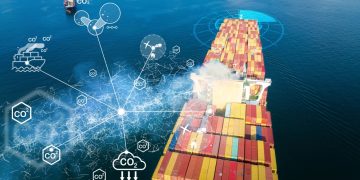During a discussion on the second day of the 2023 Crew Welfare Week, ship managers focused on the key challenges related to seafarers’ wellbeing and highlighted the impact of technology and digitalization in shipping industry.
The panel moderator Namrata Nadkarni, CEO of Intent Communications Ltd. and maritime content creator for 20 years, welcomed ship managers, Capt. John Lloyd, Chief Officer of the Nautical Institute, Rob Gale, head of training at the IMEC, Helio Vicente, senior manager policy and employment affairs, ICS, Capt. Akshat Arora, UK P&I Club based in Singapore, and Jongchul Park, Technical Officer, IMO.
Challenges that seafarers have to face
There are many challenges that seafarers have to face onboard. Firstly, seafarers suffer stress because they are away from family for a long period of time, they may be worried about loved ones and they lack quality sleep. In addition, they have to deal with piracy, which is a terrifying experience, and it is on the increase. Piracy can affect seafarers’ well-being and their life onboard.
Furthermore, during the COVID-19 pandemic the most important challenge was that seafarers were not allowed to go ashore, and they were confined onboard their ships for a long period. “According to the findings of the report of the Seafarers Happiness Index of 2023, even though COVID-19 is down, seafarers are still facing the challenges of that period. Seafarers had to face the pandemic and now they are faced the war in Ukraine, where a lot of ships are stuck, and a lot of people are in war zone areas”, commented Capt. Akshat Arora.
Jongchul Park, explained that a serious challenge that crew onboard faces is bullying and harassment including sexual research such in the maritime sector. “According to a study, 17% of women’s leaders are going to be suffering from sexual assault and harassment on board”, added.
For these reasons, the shipping industry should treat seafarers with respect and understanding, to realize that when they are assigned to a ship, they travel safely, without facing bullying onboard and other challenges.
For me the key thing that seafarers should remember is that their voices are heard. It’s integral to making seafarers worldwide feel that they are supported, and they have a voice. The most important is to make them feel part of an identity of the bigger picture.
…Rob Gale commented.
It becomes clear that shipping industries and their collaboration with other companies play a key role in crew’s life. They should be committed to exploring collaboration from the start. Helio Vicente, noted that: “I hate the word partnership when it actually leads to nothing, but it’s a nice press release somewhere. What we want is practical partnerships, that will achieve practical things.”
It’s very easy, in the social media season, to put out a press release showing that you care but actually what IMEC is interested is in tangible results that actually have an impact. That doesn’t have to always be something large scale, it can be the steps toward something.
..Rob Gale said.
The technology to be used to help the industry in job
Among the challenges that seafarers have to face is the new technologies. The maritime industry has entered the era of digital transformation later than other sectors, but with cautious optimism towards a better shipping ecosystem. This is because the adoption of new technologies is a hard task in general and for the maritime industry even harder.
However, according to Helio Vicente, many companies already have support systems in their countries whether it’s through the crewing agent or not. “To the point about autonomous shipping, I’m always very cautious when I talk about it”, added.
At this point, there are different levels of autonomy and as digitalization will take more of its own manning levels, will gradually reduce.
Collaboration is the key that industry needs to prepare itself for creating alternative routes for the seafarers.
..commented Capt. Akshat Arora.
According to Capt. Akshat Arora, digitalization is one of the most important topics nowadays. The crew will need to be trained in different fields and different technologies.
Helio Vicente said, “The pandemic did a lot of things to a lot of people. One of the things is that ship owners really learned that we need a diverse pool. Look countries like South Africa, provided that the conditions are in place are favorable to the trading of cadets.”
Key considerations to moving forward
As Capt. John Lloyd pinpointed, “We are going through a period of technological training change, and we are also being driven by other changes. Trade is going to continue to grow, there are huge opportunities out there and do not be intimidated by the idea that every ship is going to be operated remotely.”
Captain Akshat Arora, emphasizing the importance of highlighting the positive aspects of the shipping industry, commented: ‘’Shipping should not be only in the media when something happens. It needs to be there with the positive limelight as well. Finally, all the positive stories need to be published.”
Concluding, Rob Gale highlighted the shipping industry’s commitment to ensuring the utmost safety of the sea and Helio Vicente asserted that negative stories like seafarers’ abandonment, have no place in the industry.
Explore more by watching the video herebelow

































































